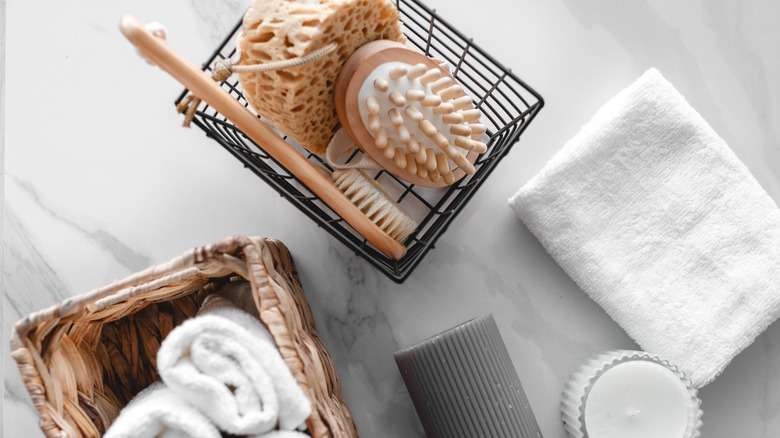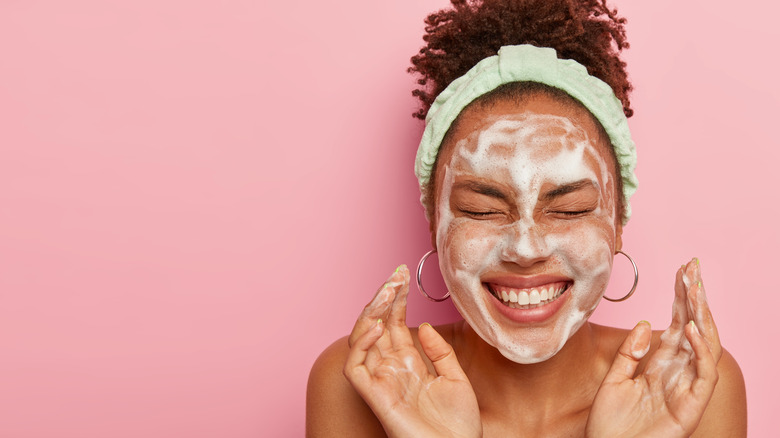Is There A Right Way To Wash Your Body?
Hopping into the shower after work or exercising is arguably one of the best feelings. It's a moment to yourself to decompress, relax, and perhaps indulge in some good ol' self-care as you slather on some foamy soap. As bathing rituals are frequently discussed, with topics as varied as peeing in the shower to the debate over if a bath is better than a shower (spoiler alert: both are healthy), you may be unsure if you're doing everything right in regards to keeping yourself clean.
When it comes to "the right way" to wash your body, there's a couple of factors you'll want to think about. Let's talk about frequency. As dermatologist Dr. Rachel Nazarian told Refinery29, "Adult skin can be washed every day, but only if using these guidelines: short showers, lukewarm water, and a gentle cleanser." Washing your body will help remove dirt, excess body oil, allergens, fungi, dead skin, bacteria, and even viruses, points out board-certified dermatologist Dr. Sara Perkins to Self. It also helps eliminate odors accumulated from sweat or bacteria.
To start, you'll want to first choose a cleanser based on your skin type for proper washing. For instance, if you're experiencing body acne, WebMD recommends using a mild cleanser with non-comedogenic ingredients that isn't extremely drying. Otherwise, if you have no skin concerns, Self says all you need is water and your favorite body wash or soap.
Is it better to use a loofah, washcloth, or your hands?
But before you start slathering on your favorite soap or "soap for sensitive skin," it's important to choose the proper tool. Are you team loofah, team washcloth, or team hands?
When it comes to each of these options, there's been a long debate about which bathing tool reigns supreme. While loofahs have excellent scrubbing power, Cleveland Clinic points out that the nooks and crannies in loofahs offer great homes for bacteria to flourish. On a similar note, warm washcloths may also cultivate a breeding ground for bacteria. As board-certified dermatologist Dr. Hadley King explains to Marie Claire, "When used, germs [on a dirty washcloth] are then spread or reintroduced to the skin, which can cause irritation and even infection." Unfortunately, hands have less scrubbing power than loofahs or washcloths.
Ultimately the best choice comes down to preference and lifestyle. Whether you're team loofah or team washcloth, Dr. Kings recommends letting your washcloths dry out completely, tossing them in the washing machine every 3-4 days to prevent the spread of microorganisms (per Marie Claire). Loofahs can also go in the dishwasher (per Cleveland Clinic). Just remember to never share your loofah with someone else.
What's the best order to wash your body?
Beyond the cleanser and choosing your scrubbing device, there's no scientific evidence that indicates the best order to wash your body. Rather, Self shares it may be easier to wash your nether regions first (aka your genitals and groin), followed by your back, chest, feet, hands, and underarms. These body parts, along with the area beneath the breasts, contain high amounts of sweat glands, so it's important to focus on cleansing where it matters most, points out dermatologist Dr. Karyn Grossman to The Greatist.
While it sounds counterintuitive, certain showering habits can also dry out your skin. Too much soap on other body parts such as your arms or shins may actually strip unnecessary oils from your skin (via The Greatist). Similarly, if you're all about long, hot showers, this may also cause the skin to dry out. In particular, Healthline shares that hot water strips the skin's natural oils and can increase inflammation, which may worsen skin irritation and itching especially for people with conditions like eczema. If you're experiencing an eczema outbreak, it's important to avoid exfoliating or scrubbing these areas. Healthline recommends taking shorter showers, using lukewarm water, and applying a hydrating moisturizer right after your shower. However, if you're still concerned about your skin, it's best to consult with a dermatologist to help you identify and manage your skin condition.



